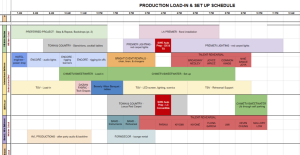Managing an event, whether it’s a wedding, product launch, or company gala, requires more than just creativity. In fact, it takes structure, strategy, and solid coordination. Fortunately, there are proven event project management methods that help planners organize effectively, adapt quickly, and deliver with impact. Below, we’ll explore five of the most effective approaches, along with resources to help you get started right away.
1. Break Down the Plan Using a Work Breakdown Structure (WBS)
To begin, every successful event starts with clear task organization. A Work Breakdown Structure (WBS) divides your event into smaller, more manageable parts. By categorizing tasks like catering, AV, venue, décor, and guest management, you can assign roles, track progress, and avoid overlooked details.
As a result, the entire planning process becomes more transparent and less overwhelming. In short, WBS helps ensure that no piece of the puzzle is missed.
2. Apply Agile Principles to Stay Flexible
Next, consider using Agile event management—a method borrowed from software development that works remarkably well for dynamic events. Agile focuses on short planning cycles (“sprints”) with regular reviews, so your team can respond quickly to new changes or challenges.
For example, if a keynote speaker cancels or the venue layout shifts, your team can adjust without derailing the whole timeline. Ultimately, Agile keeps your team aligned while reducing stress.
3. Streamline Everything with Event Management Software

In addition, technology can be a game-changer for project tracking and team collaboration. Using event management software like Cvent, Asana, or Monday.com centralizes all your details such as budgets, timelines, vendor contacts, and more, all into one real-time dashboard. If there is no budget for software, you can build a dashboard in Excel or Google Sheet.
Not only does this reduce back-and-forth emails, but it also creates a single source of truth for your team and stakeholders. In the long run, this kind of clarity leads to better execution and fewer surprises.
Pro Tip: Choose software tailored to your event size and complexity.
Resource: Top Event Management Tools helps you compare the best platforms for your needs.
4. Mitigate Uncertainty with Risk Management Planning
No matter how organized your plan is, events always carry risks. Therefore, creating a risk management plan is essential. Start by identifying possible risks—such as weather, speaker cancellations, or AV failures—and then build contingency strategies around them.
This way, you’re not reacting in the moment; you’re simply activating a plan. Consequently, risk management protects the guest experience while safeguarding your timeline and budget.
5. Align Everyone Through Stakeholder Management
Finally, don’t overlook the importance of communication. A well-managed event includes structured stakeholder engagement. Using a RACI matrix (Responsible, Accountable, Consulted, Informed), you can define everyone’s role clearly and avoid miscommunications.
Moreover, regular check-ins help gather feedback and build buy-in throughout the planning cycle. After all, when stakeholders feel heard, the event runs more smoothly.
Final Thoughts
Event project management is as much about creativity as it is about structure. By adopting these methodologies, you can navigate the complexities of event planning with confidence and ensure a seamless experience for your clients or attendees.
At THL Productions, we bring over 20 years of experience and a proven track record of success to every project and event. With PMP-certified professionals and team members formally trained in hospitality, we combine strategic project management with exceptional service. Whether you need support with a corporate event, wedding, or large-scale festival, we’ll handle every detail to deliver an unforgettable experience.
Ready to make your next event extraordinary? Contact us today to book a discovery call today.
